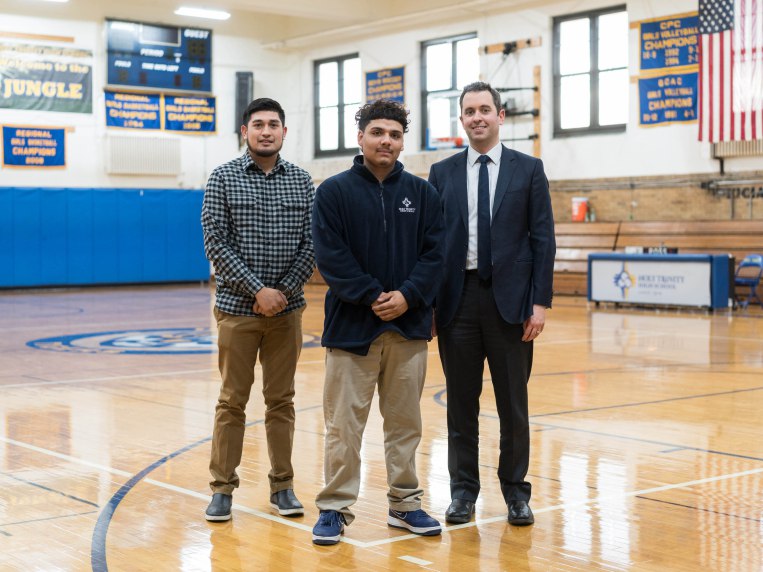
This article is by Maudlyne Ihejirika, Urban Affairs Reporter for the Chicago Sun-Times, and appeared in the December 4 edition.
From knee-high, baseball had been 15-year-old Rafael Garduno’s diversion in his rough neighborhood of Brighton Park, just as for his brother before him.
Because of that love, their baseball coach referred the Latino youth to Holy Trinity High School, which boasts a strong baseball program. There, they learned of the Partnership to Educate and Advance Kids (PEAK), a program offering inner-city youth four years tuition plus mentoring.
“My brother got accepted and is a senior now. Then I applied too,” said Rafael, a sophomore at the Wicker Park school whose grades are average.
Rafael said he struggles in some subjects but is working to bring his grades up, assisted by the PEAK mentor assigned to him for four years, Jerry Silva.
Silva, a 25-year-old youth-programs manager at Gads Hill Center in Pilsen, is well-equipped for the journey. He too is Latino, grew up in the similarly rough Back of the Yards neighborhood and played baseball since he was knee-high. He’s also a graduate of PEAK.
“I wanted to be a role model to somebody else from a very similar background whom I can advocate for. Our young adults struggle with much more than academics today,” Silva said. “It may be just a 40-minute bus ride here for Rafael, but so much can happen within that time.”
Last week, as headlines blared challenges facing Catholic schools and churches — the Archdiocese of Chicago announcing the closing of three schools and consolidation of six churches — Rafael and Silva and others with PEAK met in Holy Trinity’s cozy library to tell a different story.
Founded 20 years ago by two Notre Dame grads, PEAK works to help inner-city teens access the high-quality education Catholic schools historically have offered, and get them into college. The school is run by the order Brothers of Holy Cross, whose congregation founded Notre Dame. Through a partnership with the 110-year-old Holy Trinity, it finds sponsors to cover four years of tuition for student applicants who may not excel academically, pairing them with mentors.
“There are programs and scholarships for students growing up in tough Chicago neighborhoods who somehow are making it academically. But there are many kids who aren’t making it, and they still deserve a chance,” said Executive Director Katherine Rush.
“There are so many kids who are getting average grades and test scores — or even well below average scores — who still have the potential to graduate high school, to achieve their dreams. Those are our PEAK scholars. We don’t quit on them,” she said.
The lauded program is recognized as a Gold Star mentoring program by the National Mentoring Partnership. It’s a two-time winner of the Thomas A. Demetrio Award of Excellence for mentoring; and it won the Illinois Mentoring Partnership’s 2016 Impact Award.
Its sponsorship model keeps it small — currently serving 41 students. But thanks to a $1 million grant from the John and Mary Raitt Family Foundation, it’s tripled the number of students served this year and for the next four years.
Joining Silva and Rafael was John Malloy, 37, of Lakeview, Silva’s own mentor when he attended Holy Trinity. The two have remained close. Malloy, a married father of two, is chief operating officer at Holy Trinity, and in 2007, was the school’s first staffer to serve as a PEAK mentor.
“I’d tutored in high school and college, and enjoyed those opportunities. I thought this offered a unique experience to help in a more comprehensive way,” Malloy said. “Instead of, ‘What do you have for homework tonight?’ It’s, ‘What are your hopes and dreams?’ ”
For Silva, being assigned a white male mentor was a learning experience.
“I grew up around only black and brown people, so that’s what I was used to. At the time, I was super nervous. I had no idea what that relationship was going to look like. It required stepping out of my comfort zone to establish this relationship with somebody I didn’t know, who looked a lot different from me,” Silva said.
Like Rafael, Silva’s grades weren’t great at first, but the expectations of PEAK and Malloy helped him become an “A” to “B” student, Silva said.
“I would say I shared in some of the nervousness that Jerry had,” Malloy said. “I had some concerns about how Jerry and his family would perceive me, coming in as an outsider trying to have a say in his life. It takes a long time to earn the respect of a teenager. I was appreciative of his giving me the opportunity to be a part of his life during some very formative years.”
Holy Trinity, with a capacity of 400 and currently 350 students, has bucked the trend of dwindling Catholic school enrollment, admissions growing over the past five years. Malloy credits long-term continuity of its school and board leadership and successful academic and development programs.
PEAK mentors currently include lawyers, doctors, bankers, engineers, educators, politicians, business owners, stay-at-home moms — folks from all walks of life. And they are always seeking volunteers. “It’s fun doing the matches,” said Rush. “You’re looking for things in common, shared interests.”
As for Rafael, he was thrilled his mentor was a fellow baseball aficionado.
“We already have a really close bond. We go out to eat. We go to the YMCA for baseball practice. We went to a White Sox game,” said Rafael. “We talk or text. He gives me advice on life and what I should be doing to prepare for college. It’s great to know he’ll always be there.”